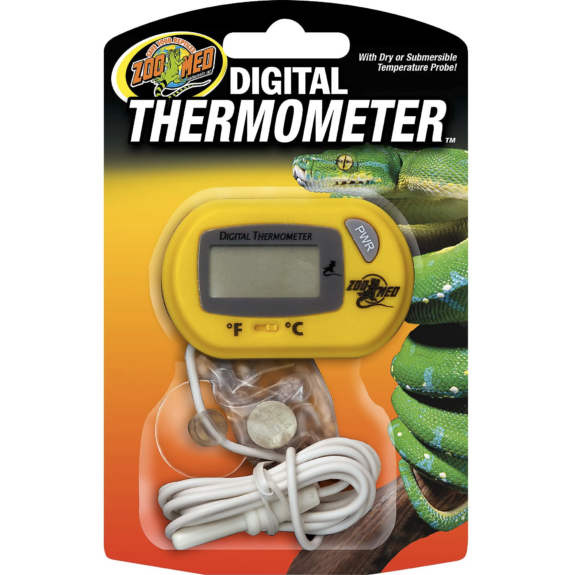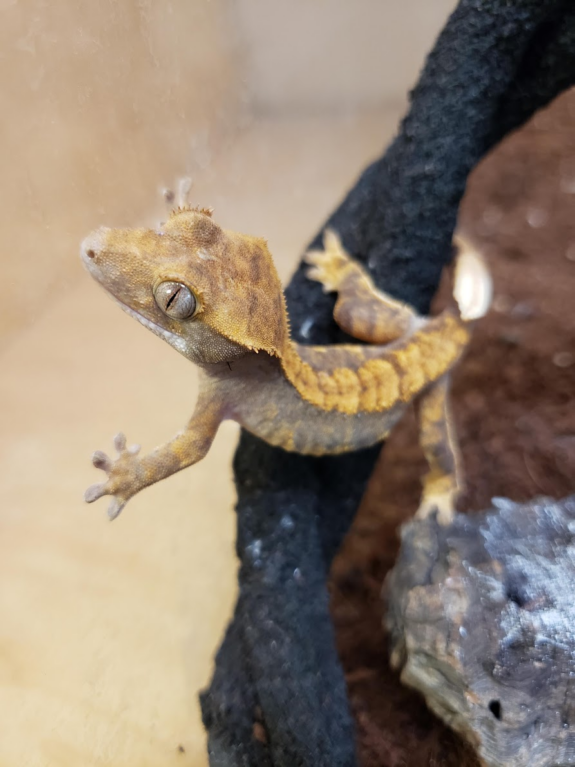Finding the right temperature for your gecko and its tank can be a daunting task. Geckos do not produce their own body heat so one very important thing for geckos is to provide supplemental heat. This can take many forms, like a basking spot, a warm hide, or just a warm end of the tank. There are also many options for producing each type of heated area. You can use a light bulb, a basking lamp, heat pad, heat cable, and others.
Does a gecko need a heat lamp?
Yes and no. It’s complicated. For instance, leopard geckos don’t need a heat lamp but they do need a heat source of some kind so they will appreciate a heat lamp if nothing else is used to give them a temperature gradient. Some geckos, like day geckos, will prefer a heat lamp over a heat mat or heating pad. If your species of gecko prefers belly heat then you will want to consider a heat pad or heat rocks, not a ceramic heater or light source. These options can work in a pinch but over the long term it is best to cater to your gecko and mimic his natural habitat as much as possible.
Can a gecko live without a heat lamp?
Yes, but only if you are providing supplemental heat from another source like a under tank heater, heat pad, or heat rocks. The best way to obtain the correct temperatures is to use a digital thermometer to measure both the hot side and the cool side. Monitor these temperatures during the day time and night time to ensure your gecko is at the proper temperature. Finding the appropriate temperature and the best type of light for your gecko can be tricky but with the right tools it’s much easier.

What happens if a gecko doesn’t have a heat lamp?
If a gecko has no heat lamp or other source of supplemental heat, he will become lethargic and lose his appetite. You will notice he will have a lower body temperature. These conditions can lead to other problems in our nocturnal animals, like: respiratory infections, excessive weight loss, lethargy, and worse. You always want to provide a supplemental heat source to help your gecko reach his or her ideal temperature. Whether you use heat bulbs, a ceramic bulb, hot rocks, or head pads, you will want to make sure your geckos heat source is in proper working order, especially during the winter.
How long do you leave a heat lamp on for a gecko?
If you are using a bright light like red lights or white lights to simulate a natural habitat, then we recommend you turn the lights off at night. If your overnight low temperatures put your gecko at risk, you will want to consider adding a heat source that doesn’t produce visible light. Simulating the normal diurnal cycle of night and day that happens outside is important to your gecko’s health. A general rule is to do 12 hours of daytime and 12 hours of nighttime. You can adjust as necessary if there is too much heat but your pet leopard gecko will appreciate roughly half day and half night.

How do you keep a gecko warm without a heat lamp?
There are many options to keep your gecko warm without a heat lamp. For instance, you can use a head pad. These are very popular and hide under the tank on the hot end making it easier to provide a natural environment inside the tank. A ceramic heat emitter is another great option. These fit into the standard ceramic socket the same as household incandescent bulbs but they do not produce visible light. They are very durable and easy to add to your gecko’s basking area.
UVB bulbs and UVB lights of the fluorescent type do not produce much heat and so they do not make good heating devices. They do provide a way for reptiles to process vitamin D if your gecko requires that type of lighting. It is never a good idea to put any live animal in a tank in direct natural light.

When providing your gecko with supplemental heat, you might consider using basking lights or heat lamps to obtain the proper temperature. There are also other options that your gecko may prefer, depending on what species it is. It is up to you to determine which solution fits your budget, your gecko’s needs, and the enclosure you provide for it. Health problems can arise if you are not providing a consistent temperature for your gecko. Proper heating is one of the most important things for your gecko’s well-being.
If you have any questions or comments please leave them in the reply section below. We’d love to hear your thoughts on which heating method works best for your gecko.



